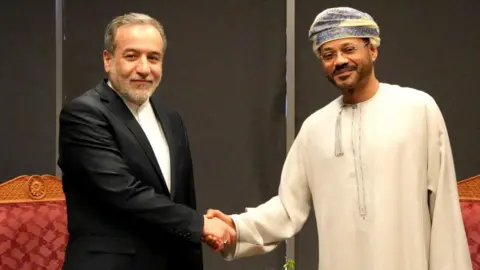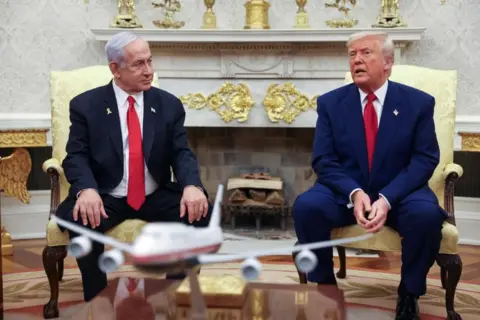 Reuters
ReutersIran’s foreign minister has arrived in Oman for talks with the United States over Iran’s nuclear programme.
Abbas Araghchi told Iranian state television his country wanted a “fair agreement” as delegations from both countries prepare for negotiations.
US President Donald Trump last month sent a letter to Iran’s supreme leader via the United Arab Emirates, saying he wanted a deal to prevent Iran from acquiring nuclear weapons and to avert possible military strikes by the US and Israel.
Trump pulled the US out of a previous nuclear agreement between Iran and world powers in 2018, and has long said he would make a “better” deal. Until now Iran had rejected renegotiating the agreement.
These discussions are the highest-level since Trump’s first term in office but it’s not clear if the two sides will sit in the same room.
“Our intention is to reach a fair and honourable agreement from an equal position, and if the other side also comes from the same position, then hopefully there will be a chance for an initial understanding that will lead to a path of negotiations,” Araghchi said.
He added that the team that came with him was made up of experts “knowledgeable in this particular field and who have a history of negotiating on this issue”.
Araghchi said the talks were “indirect” and limited to the question of their nuclear programme.
 Reuters
ReutersThe US special envoy to the Middle East, Steve Witkoff, is leading the American delegation.
Trump disclosed the upcoming talks during a visit to the White House on Monday by Israeli Prime Minister Benjamin Netanyahu, who said on Tuesday that both leaders had agreed “Iran will not have nuclear weapons”.
Trump has warned the US would use military force if no deal was reached and Iran has repeatedly said it won’t negotiate under pressure.
The US president told reporters in the Oval Office on Monday that this weekend’s meeting in Oman would be “very big”, also warning that it would “be a very bad day for Iran” if the talks were not successful.
Iran insists its nuclear activities are entirely peaceful and it will never seek to develop or acquire nuclear weapons.
However, since Trump pulled out of the 2015 agreement – which expires later this year – Iran has increasingly breached restrictions imposed by the existing nuclear deal, in retaliation for crippling US sanctions reinstated seven years ago, and has stockpiled enough highly-enriched uranium to make several bombs.

